
IMO
There are numerous organizations with the abbreviation "IMO," but assuming you are referring to the International Maritime Organization (IMO), here's a detailed overview:
International Maritime Organization (IMO)
The International Maritime Organization, often abbreviated as IMO, is a specialized agency of the United Nations responsible for regulating shipping. The IMO was established in 1948 and came into full force in 1959. Its headquarters are located in London, United Kingdom.
Mission and Objectives
The IMO's primary mission is to create a regulatory framework for the shipping industry that is fair, effective, universally adopted, and universally implemented. The organization focuses on several key objectives:
- Safety and Security: Establishing international safety regulations to ensure the security of life at sea.
- Environmental Protection: Setting standards to minimize the environmental impact of shipping activities.
- Legal Matters: Developing international maritime law to ensure efficient and equitable shipping practices.
- Technical Cooperation: Providing technical assistance and capacity-building programs, especially for developing countries.
- Efficiency and Facilitation: Streamlining procedures for international shipping to make maritime transport more efficient and cost-effective.
Key Conventions and Regulations
The IMO is known for several important international treaties and conventions, such as:
- SOLAS (Safety of Life at Sea): One of the most important treaties focusing on ship safety.
- MARPOL (Marine Pollution): International regulations aimed at preventing pollution from ships.
- COLREGs (Collision Regulations): Regulations for preventing collisions at sea.
- STCW (Standards of Training, Certification, and Watchkeeping for Seafarers): Setting qualification standards for seafarers.
- IMDG Code (International Maritime Dangerous Goods Code): Regulations for the safe transport of hazardous materials and dangerous goods.
Structure and Governance
The IMO consists of an Assembly, a Council, and five main Committees:
- Assembly: The highest governing body, composed of all Member States, which meets every two years.
- Council: Acts as the executive organ and is responsible for ensuring the functioning of the IMO.
- Committees:
- Maritime Safety Committee (MSC)
- Marine Environment Protection Committee (MEPC)
- Legal Committee
- Technical Cooperation Committee
- Facilitation Committee
Membership
The IMO has a wide membership, with around 174 Member States and three Associate Members as of 2023. These members are primarily countries with maritime interests.
Achievements and Impact
The IMO has made significant contributions to maritime safety and environmental protection:
- Reduction in Maritime Accidents: Implementation of rigorous safety standards has led to a marked decrease in maritime accidents.
- Mitigating Environmental Impact: Introduction of cleaner fuel regulations and restrictions on emissions has reduced the environmental impact of the maritime industry.
- Global Standards: The establishment of universally recognized standards has leveled the playing field, fostering fair competition and consistency across the global maritime industry.
If you meant another organization by "IMO company," please provide more context, and I’d be happy to share information accordingly.
- Phone: + 44 (0)20 7735 7611
- Web: https://www.imo.org/
IMO News
IMO Launch Day of the Seafarer 2014 'Toolkit'
IMO once again asks people everywhere to show their appreciation for seafarers and their contribution to global prosperity on the Day of the Seafarer, 25, June,…
IMO Approve New Safety Regulations for Polar Navigation
The Danish Maritime Authority (DMA) informs that the United Nations’ International Maritime Organization (IMO) has approved global binding regulations intending…
Trojan Marinex BWT System Earns IMO Type Approval
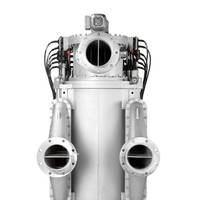
Trojan Technologies announced that the Trojan Marinex Ballast Water Treatment (BWT) product suite has obtained IMO Type Approval from DNV on behalf of the Norwegian Maritime Directorate. “We are the largest UV company in the world, and are committed to providing pioneering water treatment technologies that meet the highest standards and help protect and preserve our environment,” said Marvin DeVries, president, Trojan Technologies.
IMO Closer to Polar Environmental Regulation
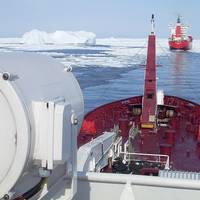
Last week, the Marine Environment Protection Committee (MEPC) of United Nations’ International Maritime Organization (IMO) agreed which ships are to be covered by the future environmental regulations for voyages in polar areas, The Danish Maritime Authority said. An international set of regulations on navigation in polar areas, referred to as the Polar Code, is still at the top of the IMO agenda. The…
IMO NOx Emission Requirements on Course for 2016
IMO’s Marine Environment Protection Committee has reached agreement on the entry into force date of new, stricter requirements for ships’ emission of NOx in emission control areas (NECAs).
KR Mobile App Contains IMO Conventions

Korean Register (KR), an IACS member classification society, announces the release of a new mobile app containing all up-to-date IMO conventions. This brand new facility is based on KR’s award winning KR-CON software which is an international database program containing the full up-to-date texts of all IMO Conventions, Codes, Resolutions and Circulars. It enables users to identify regulations relevant to a specific task and helps ensure all IMO requirements are applied correctly.
Trojan BWT System Gains IMO Type Approval (USCG Standard)
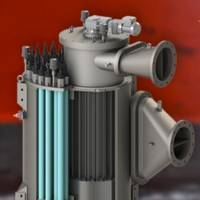
Trojan Technologies informs that their Trojan Marinex Ballast Water Treatment (BWT) product suite has obtained International Maritime Organization (IMO) Type Approval from Det Norske Veritas (DNV) on behalf of the Norwegian Maritime Directorate. "We are the largest UV company in the world, and are committed to providing pioneering water treatment technologies that meet the highest standards and help protect and preserve our environment," says Marvin DeVries, president, Trojan Technologies.
Trojan Marinex BWT System Earns IMO Type Approval
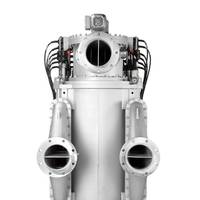
Trojan Technologies announced that the Trojan Marinex Ballast Water Treatment (BWT) product suite has obtained International Maritime Organization (IMO) Type Approval from Det Norske Veritas (DNV) on behalf of the Norwegian Maritime Directorate. “We are the largest UV company in the world, and are committed to providing pioneering water treatment technologies that meet the highest standards and help protect and preserve our environment,” said Marvin DeVries, president, Trojan Technologies.
ICS Chairman Praises IMO Efficiency

ICS Chairman, Masamichi Morooka, addressed delegates at the World Ocean Summit organized by The Economist magazine in San Francisco yesterday (25 February), following a key note speech by U.S. Secretary of State, John Kerry, and a video presentation by HRH Prince Charles (of the United Kingdom). In response to a suggestion, endorsed my most of the Summit delegates, that the United Nations might establish…
PureBallast 3.0 Gains Reactor Size, IMO Approval
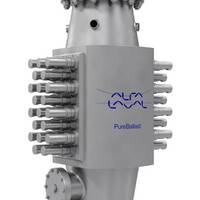
With PureBallast 3.0, Alfa Laval redefined its chemical-free ballast water treatment system, producing major advances in flexibility and energy efficiency. Now a 600 m3/h reactor has been added to the system portfolio, enabling new configurations with fewer components and considerable energy savings. In addition, the system has formally received IMO type approval from Det Norske Veritas. Since its launch in April 2013, Alfa Laval’s PureBallast 3.0 has enjoyed tremendous success.
ICS Board Prepares for IMO Meeting

The Board of Directors of the International Chamber of Shipping (ICS), representing national shipowners’ associations from 35 nations and over 80% of the world merchant fleet, met in London recently. The ICS Board agreed that ICS will continue to refrain from actively encouraging administrations that have not yet ratified the Ballast Water Management (BWM) Convention from making the additional ratifications required to bring about immediate entry into force.
IMO Update: Shipping in polar waters
Development of an international code of safety for ships operating in polar waters (Polar Code). IMO is developing a draft mandatory International Code of safety…
Environmentalists Critical of Draft IMO Polar Code
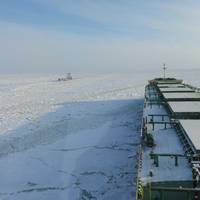
The new draft ‘Polar Code’ of safety and environmental rules, issued on 24, January 2014, fails to address the looming danger of having non ice-strengthened and poorly prepared ships in supposedly ‘ice-free’ polar waters, environmental organisations have warned. The final draft, drawn up by the International Maritime Organisation (IMO), governs ships operating in Arctic and Antarctic waters. Increased…
IMO Tackles Shipping in Polar Waters
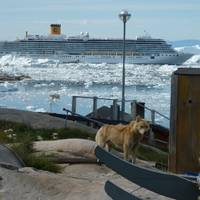
Development of an international code of safety for ships operating in polar waters (Polar Code), IMO is developing a draft mandatory International Code of safety for ships operating in polar waters (Polar Code). The work is being coordinated by the Sub-Committee on Ship Desgin and Construction (SDC) - formerly the Sub-Committee on Ship Design and Equipment (DE). During 2013, the DE sub-Committee made significant progress in further developing the draft Polar Code…
Ship Safety Core of IMO Sec-Gen's New Year Address
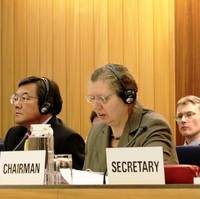
Speaking at the first meeting of the newly-formed IMO Sub-Committee on Ship Design and Construction, IMO Secretary-General Koji Sekimizu has delivered his New Year Address outlining some of the targets, challenges and priorities the Organization in year 2014. Mr. Sekimizu recalled that he was speaking on the day of the 100th anniversary of the adoption of the first ever Safety of Life at Sea Convention (SOLAS), which was a direct response to the sinking of the Titanic in 1912.
IMO SOLAS Briefing
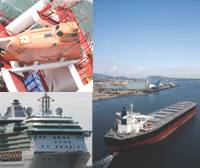
SOLAS, MARPOL amendments entered into force on 1 January 2014. IMO reminds all of immediate implications to shippers, mariners and vessels. Amendments to SOLAS, MARPOL and the Load Lines protocol entered into force on 1 January 2014: A number of amendments to the International Convention for the Safety of Life at Sea (SOLAS), the International Convention for the Prevention of Pollution from Ships (MARPOL) and the 1988 Load Lines Protocol entered into force or took effect from 1 January 2014.
A Helping Hand for IMO Environmental Regulation Compliance
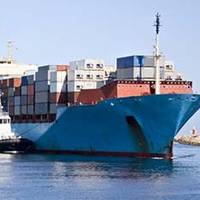
Denmark has donated DKK 200,000 for the United Nations’ International Maritime Organization (IMO). The money is intended to assist all countries in complying with the IMO requirements on ballast water management and CO2 emissions. DKK 200,000 from the Danish Foreign Ministry’s program for developing countries has just been sent to the IMO headquarters in London. Here, the money is to contribute to…
Wärtsilä's Second BWMS Gets IMO Type Approval
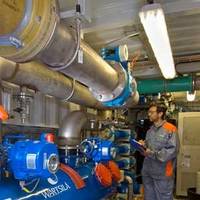
Wärtsilä say that their AQUARIUS®EC (Electro-Chlorination) Ballast Water Management System (BWMS) has been granted International Maritime Organization (IMO) Type Approval. The approval is in accordance with the requirements of the 2004 IMO Convention for the control and management of ships’ ballast water and sediments and is an essential certification pre-requisite for the system to be used onboard ships.
Intertanko Welcomes IMO Resolution on Ballast Water Management
Intertanko welcomes the agreement reached this week by the IMO’s Member States in revising the implementation schedule for the Ballast Water Management Convention…
ICS Advocates IMO Primacy Over EU on Shipping & CO2 Issues
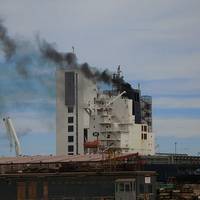
The International Chamber of Shipping (ICS) – the worldwide trade association for shipowners says it has made an important written submission to the United Nations International Maritime Organization (IMO) suggesting a possible way forward with respect to complex discussions about additional global regulations to further reduce CO2 emissions from merchant ships. In particular, ICS wishes to ensure…




